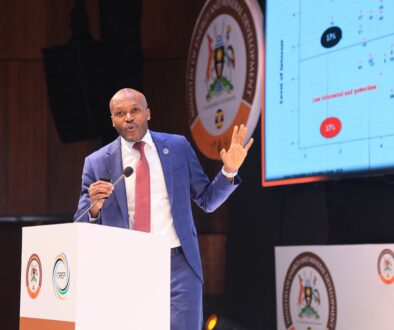CAOs, police officers get pay raise as wage bill hit Shs8.55 trillion

By Our reporter
KAMPLA – The government has increased the national wage bill by Shs724.7 billion in the 2025/2026 financial year to support salary enhancements for selected public servants, including Chief Administrative Officers (CAOs), police and prison officers, and senior civil servants in local governments.
According to Circular Standing Instruction No. 01 of 2025 issued by the Ministry of Public Service, the enhancements effective July 1, 2025 are part of a phased government plan to address persistent wage disparities in the public service. The government continues to fulfil its commitment to enhancing the salaries of all public officers in a phased manner. Accordingly, Shs57 billion has been allocated for salary enhancement,” the circular states.
Under the revised salary structure, CAOs will now earn Shs12.75 million, up from Shs2.37 million, a more than fivefold increase. Town Clerks of City Councils, Deputy Directors, Commissioners, Undersecretaries, and Foreign Service Officers (Grade I) whose previous salaries ranged from Shs1.86 million to Shs2.08 million have also been moved to the same Shs12.75 million brackets. Senior police and prison officers also received substantial raises.
Assistant Inspectors General of Police (AIGPs) and their prisons counterparts will now earn Shs12.75 million, up from Shs7–8.8 million. Senior Commissioners and Commissioners have also been elevated to that bracket. Assistant Commissioners’ salaries jumped from Shs1.6 million to Shs3.8 million, while Superintendents now earn Shs2.05 million, up from Shs990,000.
Police Constables saw more modest increases Shs466,000 to Shs583,000 while Special Constables rose from Shs375,000 to Shs469,000. Public Service Minister Muruli Mukasa said the enhancements are part of a strategy launched in the 2018/2019 financial year, which has so far seen Shs2.4 trillion invested in improving salaries, particularly in critical sectors.
“We are now entering the second phase, focusing on covering all remaining staff. With this progression, we are on track to meet 77% of our medium-term salary targets,” said Minister Mukasa. He added that the expanded wage bill will also cater to new staff recruited in the education and health sectors, particularly under the Uganda Intergovernmental Fiscal Transfers (UGIFT) programme.
“The budget now also provides for staff at newly constructed schools and health centres, and includes newly appointed departmental heads at the local government level,” he said. The announcement comes amid ongoing concerns about wage disparities, particularly among non-science civil servants. In recent months, secondary school arts teachers staged a strike demanding salary parity with science teachers.
While they later returned to class following negotiations, the Ministry of Finance said it would cost over UGX 500 billion annually to raise their salaries to UGX 4 million per month, a figure deemed unaffordable in the current budget. Nevertheless, the government has promised to implement a 25% salary increment for the group in the next financial year.
President Yoweri Museveni has consistently defended the prioritization of scientists in pay enhancements, citing their strategic role in national development. He has assured that as revenues grow, other civil servants will also benefit. With the new adjustments, Uganda’s wage bill has climbed to Shs8.55 trillion, up from Shs7.82 trillion in FY 2024/2025.
This now accounts for approximately 11.8% of the national budget, currently estimated at Shs72.4 trillion. Of the total wage bill, 58.9% goes to central government civil servants and public leaders, 48% supports personnel at the local government level, and the rest covers staff at foreign missions.


